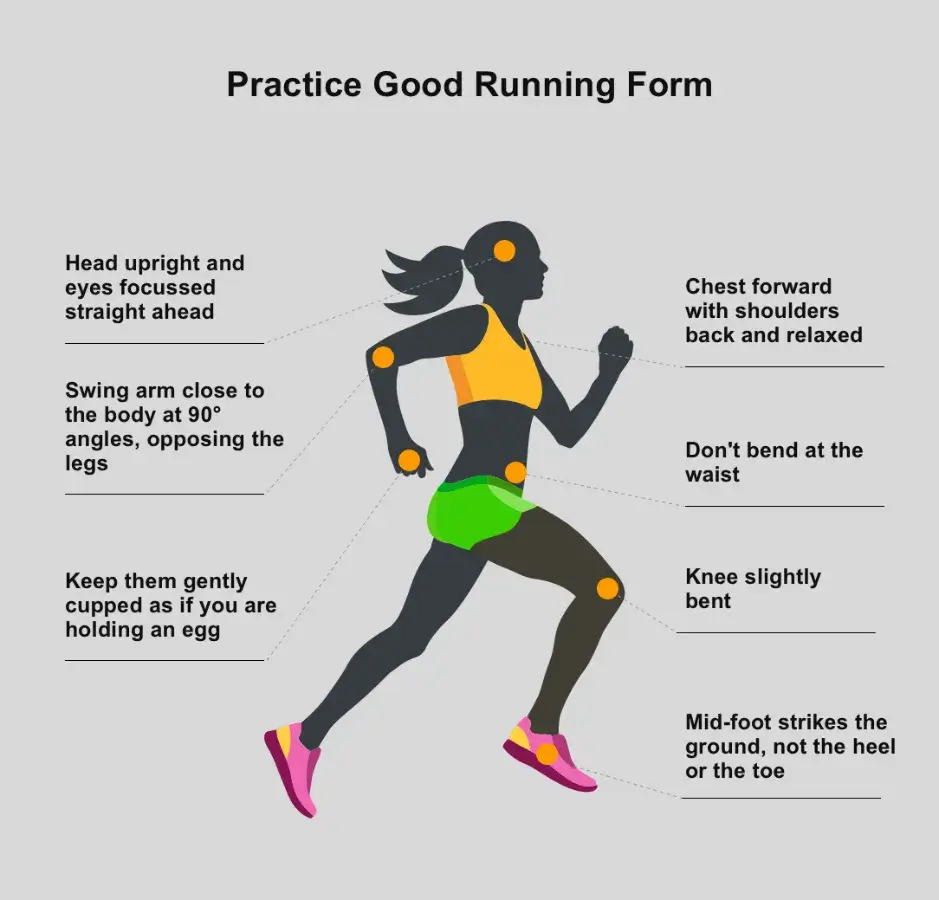Running is a fantastic way to improve physical fitness, mental health, and overall well-being. Whether you're looking to shed a few pounds, boost your cardiovascular health, or enjoy the great outdoors, running can be fulfilling and accessible. If you're new to running, getting started can seem daunting, but fear not! In this guide, we'll provide 11 simple tips to help beginners kickstart their running journey and build a strong foundation for a lifelong love of running.
1. Get the Right Gear
Before you hit the pavement, investing in proper running gear is essential. Start with a good pair of running shoes that provide the necessary support and cushioning for your feet. Visit a specialized running store for a professional fitting, as they can analyze your gait and recommend the best shoes for your needs. Additionally, opt for moisture-wicking clothing to keep you comfortable during your runs.
"Running is the greatest metaphor for life, because you get out of it what you put into it." — Oprah Winfrey
2. Start Slowly with Walk-Run Intervals
If you're new to running, avoid the temptation to sprint out of the gate. Begin with walk-run intervals to build endurance gradually. For example, start with a 30-second run followed by a 2-minute walk. Adjust the intervals to run for longer durations and walk less as your stamina improves. This approach helps prevent injury and makes the transition into running more manageable.
“I don’t run to add days to my life, I run to add life to my days.” — Ronald Rook
3. Warm Up and Cool Down
Start your running session with a warm-up and finish with a cool-down routine. A dynamic warm-up, such as leg swings or jumping jacks, prepares your muscles for the activity. After your run, perform static stretches to improve flexibility and reduce muscle soreness.
"Fast running isn't forced. You have to relax and let the run come out of you." — Desiree Linden

4. Set Realistic Goals
Setting achievable goals is crucial for motivation and progress tracking. Whether completing a certain distance or running for a specific duration, having goals gives the purpose of your run. Start with small, attainable milestones, and gradually increase the difficulty as you become more comfortable running.
“Don't be afraid to fail. It's not the end of the world and in many ways, it's the first step toward learning something better and getting better at it." — Jon Hamm
5. Listen to Your Body
Pay close attention to your body's signals. If you experience sharp pain or persistent discomfort, it's essential to stop and assess the situation. Running through pain can lead to injuries. Rest when needed, and don't be discouraged by setbacks. Healing and recovery are part of the journey.
“Running has been my main form of exercise. I've been running five or six days a week. I love it.” —Natalie Coughlin
6. Maintain Proper Form
Maintaining proper running form is vital for efficiency and injury prevention. Focus on:
- Chest: forward with shoulders back and relaxed
- Arms: Swing your arm close to the body at 90° angles, opposing the legs
- Knee: Keep the knee slightly bent
- Head: Keep your head upright and eyes focused straight ahead
- Waist: Don't bend at the waist
- Mid-foot: strikes the ground, not the heel or the toe
- Fist: Keep them gently cupped as if you are holding an egg
- Breathing: Breathe rhythmically, deeply, and steadily.

7. Find a Support System
Running can be a solitary, but sharing it with others makes it enjoyable and motivating. Join a running group or find a running buddy who can provide support and encouragement. Socializing with fellow runners can make the experience more enjoyable and help you stay accountable.
“There are clubs you can’t belong to, neighbors you can’t live in, schools you can’t get into, but the roads are always open.”
8. Create a Running Schedule
Consistency is critical to progress in running. Create a weekly running schedule that fits your lifestyle and commitments. Aim for at least three days of running per week to build endurance and see improvements in your fitness level.
"To me, sweat is workout bliss." — Brooke Burke-Charvet
9. Vary Your Routes
Running the same route can become monotonous. Explore different running routes in your area to keep things fresh and exciting. Running through parks, along trails, or new neighborhoods can provide new challenges and stimulate your mind.
"I really love going places without a map. When I went running in Paris, I headed for a monument or a statue that I could see off in the distance. To get back where I started, I simply used the GPS on my phone." — Brooklyn Decker
10. Fuel Your Body Properly
Proper nutrition plays a crucial role in your running performance and recovery. Consume a balanced diet of carbohydrates, protein, and healthy fats to fuel your runs and aid muscle recovery. Hydration is also vital, so drink water regularly, especially before and after your runs.
"I never listen to music when I run – I listen to the beat of my heart. I like to feel the blood pumping in my veins. If I’m running for a long time, I take my hydration pack. I like to disappear up a mountain or into the woods and come back two hours later." — Fred Sirieux

11. Track Your Progress
Use a running app like fitAnalytica or a GPS watch to stay motivated and monitor your improvement. These devices can help you track your distance, pace, and other metrics, allowing you to set and achieve specific goals. Seeing your progress over time can be incredibly motivating. fitAnalytica's walking, jogging, and running app empowers users to track their fitness progress. It utilizes a pedometer to monitor steps, distance, and calories burned. Whether you prefer a leisurely walk or an intense run, this app provides personalized insights to enhance your fitness journey and achieve your goals.
"How do you know if someone ran a marathon? Don’t worry, they’ll tell you." — Jimmy Fallon

Looking for More Challenges?
If you're seeking more challenges in your running journey, there's a wide range of options to explore. Beginners can set their sights on a manageable 5K run, perfect for building endurance. Intermediate runners may want to tackle a 10K, offering a bit more distance and a chance to push their limits. Advanced runners can aim for the demanding 15K, a test of both stamina and speed. For those looking to go the extra mile, a half marathon presents a substantial challenge. And for the truly adventurous, ultra marathons, with their extraordinary distances, terrain, and mental fortitude requirements, offer the pinnacle of running challenges.
| Race Category | Distance (KM) | Distance (Miles) | Difficulty | Duration |
|---|---|---|---|---|
| 5K Run | 5 Km | 3.1 Miles | Beginner | 20 - 30 minutes |
| 10K Run | 10 Km | 6.2 Miles | Intermediate | 40 - 60 minutes |
| 15K Run | 15 Km | 9.3 Miles | Intermediate | 1.5 - 2 hours |
| Half-Marathon | 21.1 Km | 13.1 Miles | Intermediate | 1.5 - 2.5 hours |
| Full-Marathon | 42.2 Km | 26.2 Miles | Advanced | 3.5 - 5 hours |
| Ultra-Marathon | 50 Km + | 31 Miles + | Expert | 5+ hours |
Conclusion
Starting a running journey as a beginner may seem daunting, but with the right approach and mindset, it can be a rewarding and enjoyable experience. Invest in proper gear, start slowly with walk-run intervals, set realistic goals, listen to your body, and maintain good form. Building a support system, creating a running schedule, exploring varied routes, and prioritizing nutrition and hydration are also essential for success. By following these 11 simple tips, you'll be well on your way to becoming a confident and proficient runner, reaping the numerous physical and mental benefits of it. So, lace up your shoes, hit the pavement, and enjoy the journey ahead!
